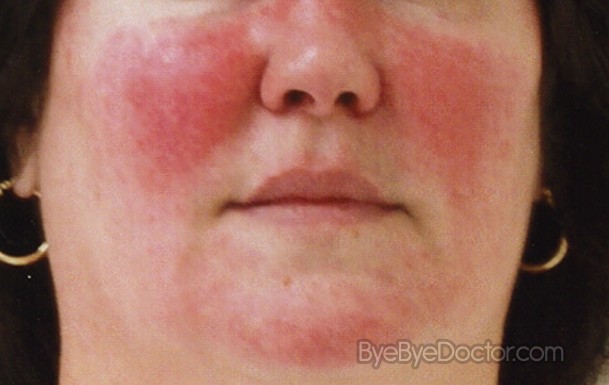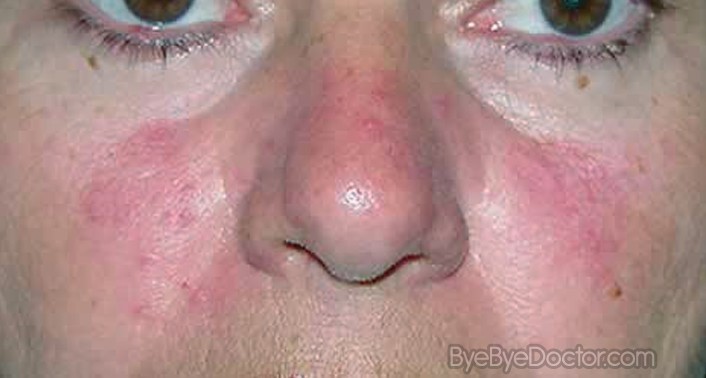What is Acne Rosacea?
This is a common red, acne-like skin problem that affects numerous individuals around the world. It mostly affects individuals who are white and have a very fair skin. The major symptoms for this skin condition include pink or red patches, visible broken blood vessels which are tiny, red small bumps, cysts which are red as well as pink or irritated eyes. The majority of individuals with this disease don’t even understand they have rosacea or that it is a treatable condition with a diagnosis. Most people who have rosacea just presume they flush or blush easily or they are just very sensitive to the sun.
Rosacea is a condition that is chronic or long term, non-curable with sporadic ups and downs. Unlike the customary teenage acne, adult patients with rosacea will not outgrow it. It normally involves the center of the face and causes constant redness or transient flushing over the regions of the nose and face that normally blush – mainly the chin, forehead and the lower half of the nose.
Acne Rosacea Diet
Not all individuals with rosacea are the same, but there are a number of triggers which are universal. By evading these possible triggers can also help to reduce symptoms as well as disease flare-ups. It is supportive to keep a individual journal of foods as well as additional triggers that can cause rosacea symptoms to flare up.
Spicy foods, drinks which are hot as well as alcohol can be the source of flushing and need to be evaded. Exposure to sunshine and to extremely cold as well as hot temperatures needs to be restricted if at all possible. Chocolate and red wine are 2 very familiar rosacea triggers. Several foods which are listed below may have little effect on rosacea but can severely affect another person. The individual patterns of reaction greatly vary with this condition.
Possible rosacea diet triggers can include:
- Dairy items including cheese, sour cream, and yogurt
- Alcohol including beer, red wine, gin, vodka, champagne and bourbon.
- Soy sauce.
- Chocolate.
- Eggplants, spinach, avocados.
- Yeast extract.
- Some beans as well as pods, such as lima, peas, and navy.
- Citrus fruits such as bananas, tomatoes, raisins, figs, or red plums.
- Hot foods whether temperature-wise or spicy.
Foods that can help to avoid these flares include, nonalcoholic cool beverages, less spicy meals, drinks which are caffeine-free, nondairy cheese as well as thermally cooler meals.
Acne Rosacea Natural Treatment
Potent steroid or cortisone drugs used on the face need to be steered clear of since they can advance the widening of the tiny vessels of the face. Some individuals experience rosacea flares that are very severe after extended use of steroids which are topical.
Any medications which are vasodilators flare rosacea. Vasodilators consist of several medications for blood pressure like calcium channel blockers, nitrates as well as thiazide diuretics.
http://www.Symptoms-Causes-treatment.blogspot.com detect diseases at an early stage symptoms, and find out the causes and treatments best suited.
These potential triggers found in skin cleansers need to be avoided:
- Witch Hazel
- Alcohol
- Eucalyptus oil
- Peppermint
- Fragrance
- Clove oil
- Salicylic acid
- Menthol
Rosacea skin is very sensitive and can flare easily with familiar acne therapies as well as other self-treatments. Any home-treatment or natural remedies need to be done with great care. As with any therapy for this condition, there are individuals who experience greater irritation or sensitivity with treatment. Two natural remedies include:
- Dilute vinegar cleansing
- Green tea applications
Diluted white vinegar used for cleansing as well as soaks for the face used daily or weekly using about 1 part table vinegar to 6 parts of water can be helpful. Vinegar is considered to be a natural antiseptic and can reduce the number of bacteria or yeasts on the skin. Because vinegar can flare rosacea in some individuals, a tiny test area needs to be tried before using on the total face.
Green tea soaks for the face can also help lessen inflammation as well as the redness seen in rosacea. Green tea has natural anti-inflammatory properties. They are also some commercially sold products which also use green tea as the active component.
Care of the skin entails using a mild cleaner for washing the face at least twice daily. Washing too much can cause irritation. Some type of sunscreen lotion is desirable every morning. Your primary care physician can prescribe a topical antibiotics for use one to two times each day under the sunscreen.
Actually rubbing the face will cause irritation to the reddening skin. There are some hair sprays as well as cosmetics which can intensify swelling and redness.
- Skin cleanser twice daily
- Sunscreen in the morning
- Avoidance of the sun
Products for the face such as moisturizers, soaps and sunscreens need to be alcohol free as well as other ingredients which are irritating. Moisturizers need to be applied gently after any topical drug has already dried. Before going outdoors, sunscreens with SFP 15 or higher are advised.
Acne Rosacea Pictures

before and after






